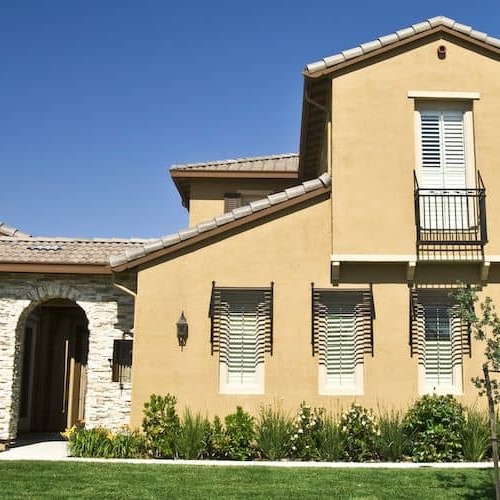How much money do you need to buy a house?
Aug 30, 2024
•5-minute read

Whether you’re purchasing a starter home, a forever home or a vacation home, buying a house is an exciting endeavor. But, this potentially life-changing investment can also get expensive, especially when you consider that it’s likely one of the largest purchases you’ll ever make.
Many costs are involved in the process of buying a home, from the down payment and closing costs to homeowners insurance and property taxes. Being familiar with all the costs associated with homeownership will help you know how much you need to buy a house.
As you figure out what you will need to spend and what you can afford, it’s worth keeping in mind that experts recommend spending no more than 28% of your income on housing.
How much does it cost to buy a house in 2024?
According to the National Association of REALTORS®, the median sales price in the U.S. in June 2024 was $426,900 for a single-family home. While this number is a helpful reference for home buyers in 2024, the cost to buy a house will depend on several factors – including location, housing market trends and home size.
A breakdown of upfront home buying costs
As you begin your home search, it’s wise to consider several upfront home buying expenses. Here are some of the most significant home buying fees, along with an estimate of how much they’ll be on a $400,000 home you’re financing with a conventional conforming loan:
| Home-buying cost | Typical amount | Total cost with a $400,000 home |
|---|---|---|
| Earnest money | 1% – 2% of purchase price | $4,000 – $8,000 |
|
Down payment |
3% – 20% of purchase price |
$12,000 – $80,000 |
|
Closing costs |
3% – 6% of loan amount |
Varies with loan amount needed after down payment |
|
Moving costs (local) |
N/A |
$1,000 – $7,000 |
Down payment
Simply put, a down payment is the cash a home buyer pays upfront in a real estate transaction. It’s a percentage of the home’s purchase price, and it’s possible in some cases to get a conventional loan with as little as 3% down.
However, a down payment of 20% or more may mean a lower mortgage rate and will provide an opportunity to avoid paying private mortgage insurance (PMI).
The minimum down payment requirement in terms of percentage is based on the type of home loan you apply for.
Here’s the minimum down payment percentage for the four main home loan programs, (assuming you’re buying a primary residence that’s a single-family home) and jumbo loans. Keep in mind that not everyone buying a primary residence/single-family home will be permitted to make a down payment this low.
| Mortgage type | Minimum down payment |
|---|---|
|
Conventional conforming loan |
3% |
|
FHA loan |
3.5% |
|
VA loan |
0% |
|
USDA loan |
0% |
|
Jumbo loan |
10% – 25% (varies depending on your credit score, the loan amount and how you plan to occupy the property) |
Earnest money
The earnest money deposit is a sum of cash a home buyer typically pays to show the seller they’re committed to buying the seller’s home after signing a purchase agreement. It usually equals 1% – 2% of the home’s purchase price. Though this deposit isn’t usually required, it’s become pretty standard. The earnest money deposit is customarily applied to any down payment you make at closing.
Closing costs
Another significant expense in buying a house is closing costs, which are various fees you’ll pay at closing. Closing costs can range from around 3% – 6% of the loan amount. You can ask the seller to pay for part or all of your closing costs, but sellers are less likely to do so in a competitive real estate market.
Here are a few of the closing costs you should be prepared to pay:
- Home appraisal fee: Your lender will order a property appraisal, for which you’ll have to pay the home appraisal fee. An appraisal typically costs $300 – $600. However, it may cost more if the property has multiple units or is located in a remote area.
- Title fees: The title company will charge title fees, which cover the cost of a record search to ensure the absence of any claims or judgments against the property. These fees will make up a large part of your closing costs.
- Mortgage origination fee: The mortgage origination fee sometimes covers the cost of both processing and underwriting your home loan. This fee is typically 0.5% – 1% of the loan amount and is sometimes referred to as the processing fee, underwriting fee or application fee, although these fees may be separate from the origination fee.
Prepaid costs
When buying a home, you typically must prepay certain expenses such as property taxes, homeowners insurance and some mortgage interest. Your mortgage lender will likely have you make an initial escrow deposit that they’ll put into an account for you. Your lender will then use the escrow account to pay any property taxes or homeowners insurance premiums when they come due.
Moving costs
Whether you’re moving across a city, a state or a country, it’s important to set some cash aside to cover your moving expenses. The average cost of a local move is around $2,300, while a long-distance move (over 100 miles) averages around $4,600.
Ongoing home buying costs
Once you’ve purchased a home, you’ll also need to stay on top of the long-term expenses related to owning the house.
Mortgage payments
Your monthly mortgage payments will consist of two main components: payment toward your principal balance (the total amount borrowed for the home loan) and interest. A chunk of your payment will also typically go toward property taxes and homeowners insurance.
Mortgage insurance
Depending on the type of home loan you’re using – and in the case of a conventional conforming loan, the size of your down payment – you may be required to pay mortgage insurance.
This protects your lender if you default on the loan. Mortgage insurance, in the form of what’s known as MIP, is required on FHA loans for at least 11 years but can be dropped later with a down payment of 10% or more.
HOA fees
If the home you’re buying is in a community with a homeowners association (HOA), you’ll likely have to pay HOA fees. These charges help fund certain services and amenities, such as trash removal, security, and access to a community pool.
To better estimate your monthly mortgage payment amount, use the Rocket Mortgage® mortgage calculator.
Monthly expenses
There’s no one-size-fits-all answer for how much you should spend on your first home. But, a good rule here is to avoid spending more than 28% of your gross income on your monthly mortgage payment. Based on this percentage of income, you can determine the home price you can afford, and ultimately how much cash you’ll need to buy a house.
How to prepare to buy a house
You’ll likely need some time to prepare to buy a house. As part of getting your finances in order, you can take the following steps so you’ll be ready to purchase your first home:
- Start saving for a down payment by avoiding unnecessary spending.
- Earn additional income through a new hide hustle or part-time work.
- Create a budget for what you can afford.
- Monitor your credit score.
- Pay off as much debt as possible in an effort to lower your debt-to-income ratio.
- Compare mortgage lenders.
- Apply for a loan preapproval to see how much you qualify for.
The bottom line: How much you need to buy a house depends on your situation
Buying a home involves various costs, often including a down payment, insurance, an inspection, closing costs, deposits and other fees.
Once you’ve assessed all of the costs involved, take the first big step toward homeownership and start the mortgage approval process to learn more about your specific home buying costs and options for financing a home purchase.

Victoria Araj
Victoria is a former Team Leader of editorial content at Rocket Mortgage and she held roles in mortgage banking, public relations and more in her 19+ years with the company. She holds a bachelor’s degree in journalism with an emphasis in political science from Michigan State University, and a master’s degree in public administration from the University of Michigan.
Related resources

8-minute read
How to budget for a house: A home buyer’s guide to housing costs
Knowing how much you can afford to spend is an important first step toward buying a home. Learn how to set a budget that can help you afford a mortgage.
Read more

8-minute read
How much you should spend on a house?
Wondering how much you should spend on a house as you begin the home buying process? Learn what your budget should be based on your income and expenses.
Read more
7-minute read
What is cash to close?
In order to close on your house, you will need to bring cash to close the mortgage deal. Learn what expenses are included in your cash-to-close amount and mo...
Read more